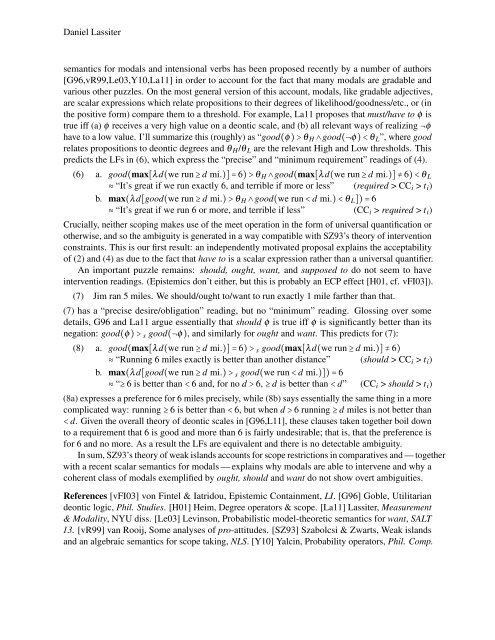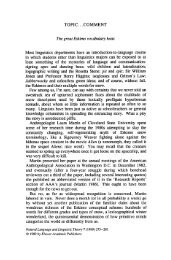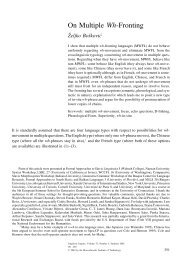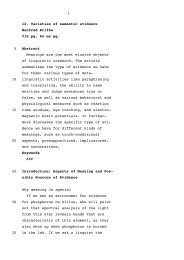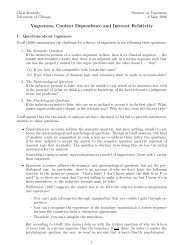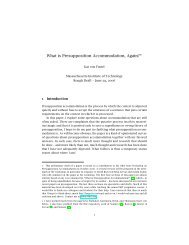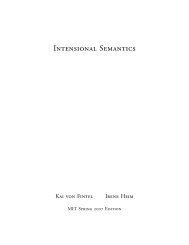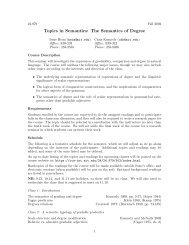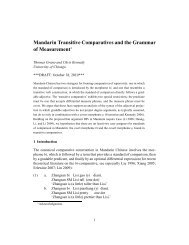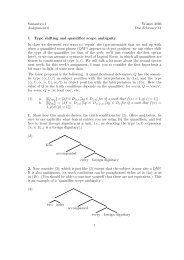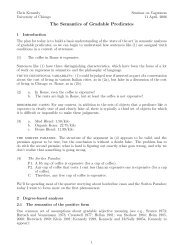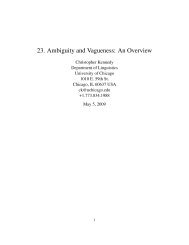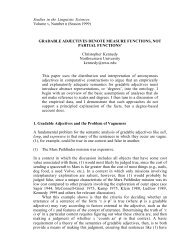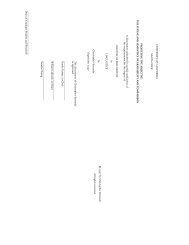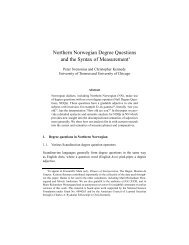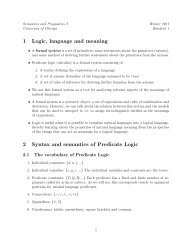On the natural history of negative polarity items - Syntax, Semantics ...
On the natural history of negative polarity items - Syntax, Semantics ...
On the natural history of negative polarity items - Syntax, Semantics ...
You also want an ePaper? Increase the reach of your titles
YUMPU automatically turns print PDFs into web optimized ePapers that Google loves.
Daniel Lassiter<br />
semantics for modals and intensional verbs has been proposed recently by a number <strong>of</strong> authors<br />
[G96,vR99,Le03,Y10,La11] in order to account for <strong>the</strong> fact that many modals are gradable and<br />
various o<strong>the</strong>r puzzles. <strong>On</strong> <strong>the</strong> most general version <strong>of</strong> this account, modals, like gradable adjectives,<br />
are scalar expressions which relate propositions to <strong>the</strong>ir degrees <strong>of</strong> likelihood/goodness/etc., or (in<br />
<strong>the</strong> positive form) compare <strong>the</strong>m to a threshold. For example, La11 proposes that must/have to f is<br />
true iff (a) f receives a very high value on a deontic scale, and (b) all relevant ways <strong>of</strong> realizing ¬f<br />
have to a low value. I’ll summarize this (roughly) as “good(f) > q H ⇥good(¬f) < q L”, where good<br />
relates propositions to deontic degrees and q H/q L are <strong>the</strong> relevant High and Low thresholds. This<br />
predicts <strong>the</strong> LFs in (6), which express <strong>the</strong> “precise” and “minimum requirement” readings <strong>of</strong> (4).<br />
(6) a. good(max[ld(we run ⇤ d mi.)] = 6) > q H ⇥good(max[ld(we run ⇤ d mi.)] 6) < q L<br />
⇥ “It’s great if we run exactly 6, and terrible if more or less” (required > CCi > ti)<br />
b. max(ld[good(we run ⇤ d mi.) > q H ⇥good(we run < d mi.) < q L]) = 6<br />
⇥ “It’s great if we run 6 or more, and terrible if less” (CCi > required > ti)<br />
Crucially, nei<strong>the</strong>r scoping makes use <strong>of</strong> <strong>the</strong> meet operation in <strong>the</strong> form <strong>of</strong> universal quantification or<br />
o<strong>the</strong>rwise, and so <strong>the</strong> ambiguity is generated in a way compatible with SZ93’s <strong>the</strong>ory <strong>of</strong> intervention<br />
constraints. This is our first result: an independently motivated proposal explains <strong>the</strong> acceptability<br />
<strong>of</strong> (2) and (4) as due to <strong>the</strong> fact that have to is a scalar expression ra<strong>the</strong>r than a universal quantifier.<br />
An important puzzle remains: should, ought, want, and supposed to do not seem to have<br />
intervention readings. (Epistemics don’t ei<strong>the</strong>r, but this is probably an ECP effect [H01, cf. vFI03]).<br />
(7) Jim ran 5 miles. We should/ought to/want to run exactly 1 mile far<strong>the</strong>r than that.<br />
(7) has a “precise desire/obligation” reading, but no “minimum” reading. Glossing over some<br />
details, G96 and La11 argue essentially that should f is true iff f is significantly better than its<br />
negation: good(f) > s good(¬f), and similarly for ought and want. This predicts for (7):<br />
(8) a. good(max[ld(we run ⇤ d mi.)] = 6) > s good(max[ld(we run ⇤ d mi.)] 6)<br />
⇥ “Running 6 miles exactly is better than ano<strong>the</strong>r distance” (should > CCi > ti)<br />
b. max(ld[good(we run ⇤ d mi.) > s good(we run < d mi.)]) = 6<br />
⇥ “⇤ 6 is better than < 6 and, for no d > 6, ⇤ d is better than < d” (CCi > should > ti)<br />
(8a) expresses a preference for 6 miles precisely, while (8b) says essentially <strong>the</strong> same thing in a more<br />
complicated way: running ⇤ 6 is better than < 6, but when d > 6 running ⇤ d miles is not better than<br />
< d. Given <strong>the</strong> overall <strong>the</strong>ory <strong>of</strong> deontic scales in [G96,L11], <strong>the</strong>se clauses taken toge<strong>the</strong>r boil down<br />
to a requirement that 6 is good and more than 6 is fairly undesirable; that is, that <strong>the</strong> preference is<br />
for 6 and no more. As a result <strong>the</strong> LFs are equivalent and <strong>the</strong>re is no detectable ambiguity.<br />
In sum, SZ93’s <strong>the</strong>ory <strong>of</strong> weak islands accounts for scope restrictions in comparatives and — toge<strong>the</strong>r<br />
with a recent scalar semantics for modals — explains why modals are able to intervene and why a<br />
coherent class <strong>of</strong> modals exemplified by ought, should and want do not show overt ambiguities.<br />
References [vFI03] von Fintel & Iatridou, Epistemic Containment, LI. [G96] Goble, Utilitarian<br />
deontic logic, Phil. Studies. [H01] Heim, Degree operators & scope. [La11] Lassiter, Measurement<br />
& Modality, NYU diss. [Le03] Levinson, Probabilistic model-<strong>the</strong>oretic semantics for want, SALT<br />
13. [vR99] van Rooij, Some analyses <strong>of</strong> pro-attitudes. [SZ93] Szabolcsi & Zwarts, Weak islands<br />
and an algebraic semantics for scope taking, NLS. [Y10] Yalcin, Probability operators, Phil. Comp.


